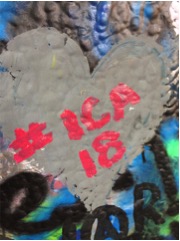
May is not only the traditional time for EMHIS-meetings in Bournemouth but also for the International Communication Association’s (ICA) annual conferences! This year, the media and communication studies megaevent was held in Prague and gathered 3,500 scholars from all around the globe to discuss the theme “Voices”. EMHIS-members Philipp Seuferling and Stephanie Seul were among them. Hot weather and the many distractions of Prague’s beautiful Old Town just outside the conference hotels didn’t keep us from delving into the overwhelming number of panels and engaging in academic exchange.
Stephanie presented a paper entitled “A Forum for Self-reflection on the Jewish War Experience: The German-Jewish Press, 1914-1918” to the Communication History Division. The paper highlighted the importance of Jewish newspapers and magazines for the communal and intellectual life of German-Jewry during the First World War and analysedthe discourses on the Jewish war experience in selected periodicals of contrasting religious and political stance. The outbreak of war triggered a lively discussion on the current and future position of the Jews within the German nation in Jewish papers. Initial hopes that the war would increase Jewish recognition and equalitywere, however, thwarted, for the war led to a rise in antisemitism and thus to experiences of exclusion at home and at the front.
I – Philipp – presented a paper on “Media, Memory, and Refugee Activism Across History” within the newly founded Activism Communication, and Social Justice Interest Group. In the presentation, I historically underpinned how mediations of suffering and forced migration make use of memory cultures, e.g. of Flight and Expulsion after the Second World War or of the Holocaust, which can serve as a motivation for refugee activism and volunteering. He showed how in Germany, memories of previous migrations played an important role in volunteering movements for Biafra in 1968, Vietnam in 1978 and the so-called “refugee crisis” in 2015.
Attending sessions mainly on media and migration – i.e. outside the Communication History Division – many panels however left me reflecting on the role of media history and the necessary interventions it can deliver to media and communication studies. A few panels would have gained from deeper historical contextualization and less rhetoric of newness and novelty of certain phenomena. An engaging “Blue Sky Workshop: Doing Communication History: A Methodological Roundtable” reflected on the challenges and responsibilities media and communication historians face and have to take on – which is exactly where approaches as the one EMHIS is offering are crucial for informing research on media in society from historical, transnational and entangled perspectives, which often seem neglected.
Yet, the conference program not only offered stimulating panels, but also left enough room for many receptions – opportunities to meet old and new faces, which was only encouraged by the many open bars and free buffets on a daily basis.
Ultimately, the final conference day offered a last highlight: legendary scholar Elihu Katz himself gave a “Monday Plenary” lecture on his work with Paul Lazarsfeld back in the days. His insights demonstrated how we are still trying to understand the same phenomena, namely the multiple roles and impacts of media and communication in societal context, be it in the 1940s or in 2018. The fundamental questions haven’t changed, which maybe is the most vivid argument for considering the history of it all.
Philipp Seuferling
